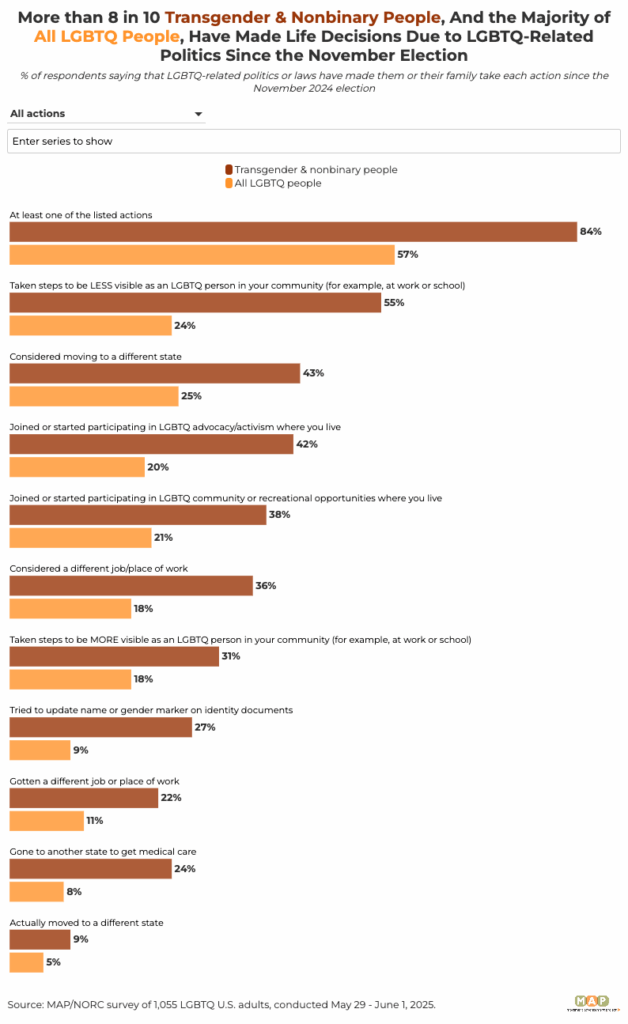Equality Maps Round-Up: Tracking Wins and Trends in 2025
| 2025 began with the Trump administration keeping its promise to escalate federal attacks against the LGBTQ community. Within the first 100 days, we were bombarded with a barrage of anti-LGBTQ executive orders, rule changes, and policy rescissions targeting the most vulnerable, and hateful rhetoric that inspired similar efforts at the state and local levels.In 2025 alone, over 700 anti-LGBTQ bills were introduced in 49 states, the most prevalent of which deliberately target the transgender community and LGBTQ youth. However, despite these major attempts to erase LGBTQ people, by the end of the legislative sessions our community defeated at least 88% of the anti-LGBTQ bills introduced, challenged harmful state and federal actions via litigation efforts, successfully organized massive demonstrations across the country, and most importantly activated voters to turnout for this year’s general election. After notable wins in the November elections, it is clear that the tides are turning and pro-equality candidates, advocates, and activists are feeling especially energized as we head into 2026. Highlighting Key Wins in 2025 “Shield” or “refuge” laws protecting transgender health careSee our Equality Map here and our supporting citations and additional information here. May 12: Washington state expanded its existing shield law, adding new privacy protections. Read more details here. May 13: Vermont expanded its existing shield law in multiple ways. Read more details here. May 16 and May 23: Colorado enacted two new bills, expanding existing protections in multiple ways, including new privacy protections related to testosterone prescriptions. June 20: Delaware’s governor issued an executive order to protect both patients and providers of medically necessary care for transgender people. Delaware is now one of three states with a “shield” executive order that protects access to transgender health care. As of December 15, 14 states and D.C. have a “shield” law protecting access to transgender health care. |
| Conversion “therapy” lawsSee our Equality Map here and our supporting citations and additional information here. February 19: Westerville, Ohio, became the 13th city in the state to ban conversion “therapy” practices at the local level.July 8: The Wisconsin Supreme Court ruled, after a multi-year battle between the governor and the legislature, that the state’s regulatory protections against conversion “therapy” can go into effect. Read more about this multi-year effort here. August 19: Whitehall, Ohio, enacted a new ordinance protecting LGBTQ youth from conversion “therapy,” becoming the 14th municipality in Ohio with such an ordinance. Whitehall’s new ordinance also prohibits discrimination against LGBTQ people in employment, housing, and public accommodations. While the state lacks similar statewide protections, Whitehall is the 40th municipality in Ohio with fully inclusive, local-level nondiscrimination protections. As of December 15, 23 states and D.C. prohibit licensed health care providers from subjecting minors to conversion “therapy.” |
| Identity document laws and policies See our Equality Map here and our supporting citations and additional information for driver’s licenses, birth certificates, and name changes. February 7: Illinois enacted a new law eliminating the publication requirement for name changes, a move that helps protect the privacy and safety of transgender people. The new law also reduced the residency requirement from six to three months, allowing faster access for those who have recently relocated to the state .September 30: Arizona began issuing amended birth certificates to transgender people, regardless of whether they’ve undergone surgery to change their appearance. The ruling permanently struck the word “operation” from an Arizona law that required people to go through a “sex change operation” before they can be issued a new birth certificate that aligns with their gender identity. October 1: The Virgin Islands issued an executive order relating to gender marker changes for identity documents. November: As part of the final budget for 2026, Massachusetts no longer requires the publication of name changes. See here for more details. Protections for marriage and family formationSee our Equality Maps for parentage laws and marriage and relationship recognition, as well as our supporting citations and additional information for types of adoptions and voluntary acknowledgement of parentage (VAP). March 21: New Mexico became the ninth state to offer confirmatory adoptions, offering another accessible pathway to establish a legal relationship between parent and child. April 7: Colorado repealed its legislative ban on marriage equality, following its repeal of its constitutional amendment ban in November 2024. Now there are no remaining bans in Colorado. May 23: Vermont became the 10th state with a confirmatory adoption process. Read more details here.June 3: Nevada became the 11th state to offer confirmatory adoption. July 7: Hawaii modernized their parentage laws, making the voluntary acknowledgement of parentage (VAP) process explicitly available to non-genetic and LGBTQ parents. August 8: Oregon also extended the VAP process to non-genetic and LGBTQ parents. October 30: Illinois passed comprehensive legislation updating their parentage laws, including expanding the VAP process and establishing a uniform and streamlined confirmatory adoption provision throughout the state for children born through assisted reproduction.As we move into the 2026 legislative session and prepare for what lies ahead, we are also acutely aware of the power and strength of the LGBTQ community and the strategic efforts of our movement partners to shift to a more proactive stance. While maintaining a focus on policy proposals in particularly active states, such as MAP will also continue tracking over 50 different LGBTQ-related laws and policies through our Equality Maps, which are updated in real time. Stay tuned for our legislative session forecast in January 2026. |


